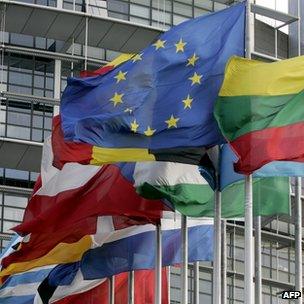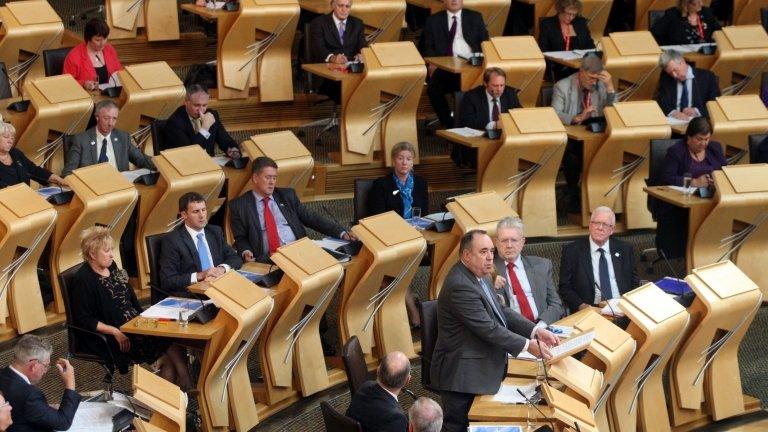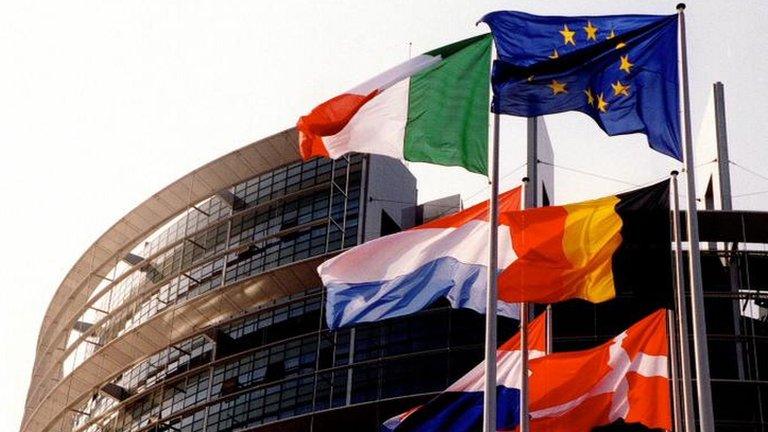Chunter no more....
- Published
The Presiding Officer, it would appear, is averse to chuntering. No, no, with a "t". Not a "d" - although one imagines she would be even less inclined to tolerate such behaviour in the environs of Holyrood.
Anyway, chuntering. Up with this form of low, inarticulate grumbling Tricia Marwick will not put.
And she made her views very clear as she chaired the latest session of questions to the First Minister.
She had no objection whatsoever to the MSPs who had turned up eager to question the FM, politely or otherwise.
It was those involved in sidebar conversations and muttered comments from the wings who drew her ire.
Chuntering, she averred, had to stop. It would not do. Since a prolonged sabbatical is out of the question, one fears that the estimable Ms Marwick may simply have to steel her soul and prepare to endure a fair deal of loathsome chuntering in the period ahead.
I imagine she will do so with commendable dedication. Fifers are used to inuring themselves against unwarranted irritation from the outside world. It is a skill taught in nursery school.
Today's dose of low murmuring accompanied exchanges over the question of whether Scotland would be automatically a member of the European Union upon independence - or whether there would have to be an entirely new application, vulnerable to a veto from existing EU states.
See BBC reports passim - and this website. But, in summary, a Commission spokesman, Olivier Bailly, initially appeared to suggest that a fresh application would be required from territories which secede from member states.
'Big problem'
He then backtracked, emphasising that there were several scenarios which could be canvassed - and it was not up to the Commission to rule between them.
Round about the same time, his boss, Commission President Jose Manuel Barroso, was asked (by the BBC) to offer his view.
He said that speculation upon secession was not for him - but went on to say that new states had to apply from scratch. Aha, said Unionists, big problem for the SNP. No, no, say Nationalists, doesn't apply to us - we're already in there.

The ears of Scots politicians were listening to what was going on at Strasbourg this week
For Labour, Johann Lamont was on rather good form in pursuing the topic with the FM. Actually, she began on a note of consensus, praising Andy Murray's tennis triumph as the culmination of a "wonderful summer of sport." Alex Salmond agreed, enthusiastically. Both diplomatically sidestepped the Hampden Tragedies (plural.)
The consensus, of course, did not last. Ms Lamont quoted Mr Barroso on the subject of new states.
If, she said, the aim of the SNP was not to establish a new state then, she wondered, what had they been on about for the past near-century?
She further suggested that Mr Salmond might help resolve the question by ending the court action which is designed to prevent disclosure of whether the Scottish Government has received legal advice on the issue - and what that legal advice might be.
In response, Mr Salmond noted - rightly - that it has been a matter of principle for all governments to decline to publish or even acknowledge the existence of legal advice. That is to allow such advice to be given frankly and fully.
He argued further that there is a difference between an external accession state - and a territory that has been in membership of the EU for forty years. (Courtesy, of course, of the United Kingdom - as Mr Salmond did not add.)
Big risk
Mr Salmond, of course, fully understands the import of this issue. His opponents want to sow doubts in the minds of the voters with regard to the independence project: on the economy, on defence, on the EU. He wants to project clarity, assurance.
At the very minimum, the controversy over the last couple of days leaves doubts in the air. Mr Salmond knows that - which is why he promised that the issue would be fully addressed in the Prospectus for independence which the Scottish Government will publish in October 2013, one year out from the referendum. That verdict, he said, would be founded upon legal advice.
Is that enough? Not immediately, no. Although, of course, depending upon the quality of the evidence produced in that Prospectus, it may ultimately be so.
At the same time, the UK Government is preparing its own dossier with regard to issues raised by independence, including EU membership. Taking a big risk here - but I reckon the two dossiers might differ somewhat.

The grand slam victory of Andy Murray was marked by party leaders at FMQs
For the Liberal Democrats, Willie Rennie made a couple of reasonable debating points on the same topic when he averred that an independent Scotland might have to accept poorer terms from the EU - no rebate, join the Euro.
I think he was on slightly weaker ground in calling for negotiations with the EU to begin now. With whom would Mr Salmond negotiate, given that the formal position of the EU is that, in the first instance, it is a matter for the member state to resolve?
More generally, Mr Salmond acknowledged once more that there would be negotiations with Europe in order to establish the terms under which an independent Scotland would remain in the EU.
Patient focus
There would, he said, have to be a similar process with regard to the remainder of the UK.
All this strategy, he said, would feature clearly in the Prospectus - which he described as Scotland's "passport to independence and freedom."
It was an intriguing session of FMQs, enhanced by Ruth Davidson of the Tories who questioned the FM about the problems she said had emerged from a new patient management system in the NHS.
She cited thousands of cancelled appointments in just one board, Ayrshire and Arran. The board do not deny the raw figures but contest the cause.
Mr Salmond said a resolution was under way but sought to deflect further criticism by arguing that the position in Scotland was far better than south of the border.
- Published13 September 2012

- Published12 September 2012
